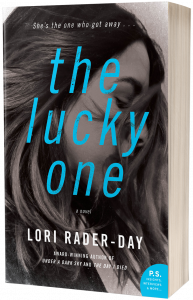 The Lucky One follows the stories of Alice Fine, who as a child emerged unscathed from a kidnapping, and Merrily Cruz, who wants badly to find her missing father – or the closest approximation to a father that she’s known. Rader-Day, in her typical fashion, fleshes out these women’s stories with psychological background to each character, building and building them, until the two women practically become real.
The Lucky One follows the stories of Alice Fine, who as a child emerged unscathed from a kidnapping, and Merrily Cruz, who wants badly to find her missing father – or the closest approximation to a father that she’s known. Rader-Day, in her typical fashion, fleshes out these women’s stories with psychological background to each character, building and building them, until the two women practically become real.
Alice’s obsession with her kidnapping leads her to a website called The Doe Pages, where people are searching for the lost. She’s drawn to it and she also thinks maybe she can find her kidnapper there. Her life is a little shut off – she’s broken up with her fiancée and she lives alone. She works in the office of the family construction company, with her father and uncle as benevolent bosses. The women on the Doe Pages, strangers, become acquaintances, then friends.
Merrily, as the book opens, is celebrating her 30th birthday, and when some cops come to her office looking for her missing father (figure), she walks off the job. She wants answers and her mother isn’t giving to her. Her mother is weirdly cagey about him. He from time to time texts Merrily, but never actually appears. Merrily thinks to herself after her birthday weekend that her mother has fed her nothing but “cake and lies.”
Of course these two stories connect, but it’s the tricky genius of the book that the ways they connect to one another only very slowly become clear. Both women are trying to find their places in the world, and to do that, they are also trying to find the places they came from – or who they came from. The essential facts of their backgrounds are holding them up from moving ahead with their lives and making real connections to other people. To essentially growing up. They are kind of frozen in time.
They mystery of Alice’s kidnapping is tied to her own memories, which are sketchy as she was a child when she was taken, and her father’s memories and the way he handled what happened to her. He now treats her with the utmost care, attempting to soften life’s edges for her. As Alice and Merrily work away at their memories, they begin to find answers to their questions, not all of them welcome or happy. The threads of the book ultimately tie up in a resoundingly satisfying way.
While Rader-Day could be classified as a noir writer as she looks at the underside of things, and finds that many of them are corrupted or not to be trusted, she ultimately ends her books with a more positive note. A thought that love or hope exists. She’s an intelligent and thoughtful writer, and her respect for the people she brings to life on the page couldn’t be clearer.